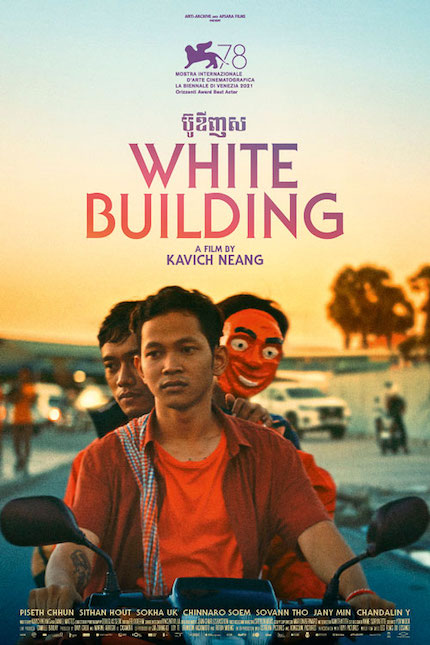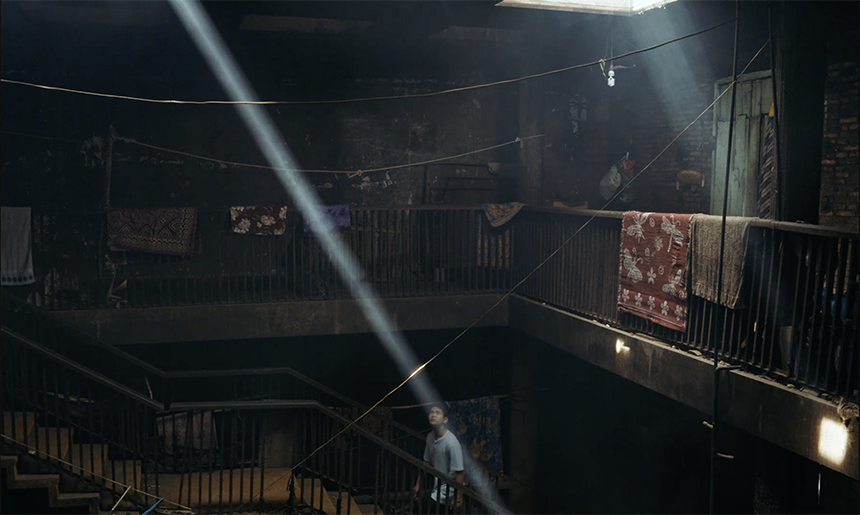WHITE BUILDING Review: Beautiful Elegy to a Not So Distant Past
Piseth Chhun stars in Kavich Neang's feature directorial debut, set in Phnom Penh, Cambodia.

Kavich Neang's White Building is a beautiful elegy for Phnom Penh's checkered past, observed by a young man full of dreams and hopes.
The old, crumbling, leaky white building of the title is the multi-household urban slum for its longtime residents.
Samnang and his friends Tol and Ah Kha dream of TV stardom by entering a dance contest. When they are not practicing in front of their small camera, they drink and talk about losing their virginity until the wee hours of the morning.
The vibrant Phnom Penh's colors and sounds through the eyes of these youths on their motorbike at night are very much like the early films of Hou Hsiao Hsien and Tsai Ming Liang. But things don't pan out for the youngsters as they hope. Ah Kha's family is moving to France to join their relatives, and their dreams of becoming dance stars fizzle out.
In the meantime, government officials are offering residents of the building mere crumbs to move out and relocate. Residents are split between taking the settlement money or staying put to renegotiate the terms. The idea of renovating the building on their own is not feasible anymore. The building is decaying with them living in it. Things are getting progressively, intentionally worse. The city officials are cutting off the water supply to the building. The Monsoon season is coming, and the ceilings are leakier than ever.
Samnang's dad, the chief of the building on behalf of the residents, is conflicted on the matter. And his diabetic conditions worsens as he refuses to go to the doctor and must face the possibility of a leg amputation.
All things must pass. The residents can't compete with the rising tide of progress. And Samnang's family relocates to the countryside. His mom laments that despite her wishes to live as a family, all her children are leaving and going back to the city.
Gentrification happens everywhere in the world. But the building, which was a subject for Neang's 2019 documentary, Last Time I Saw You Smiling, has been home for more than 400 souls. And his family was one of the those who had to relocate before the building was demolished. The director actually lived through that change.
The film is soaked with melancholy, and it's all captured with crispy digital cinematography by Douglas Seok (Minari) -- it's in the nighttime scooter ride, it's in the clothes lines hanging in the building, it's in the growing big moldy stains on the ceilings, it's in the empty apartments with the remnants of past lives and it's in the silhouette profile of Samnang's dad under the mosquito nets at night.
Contemplative and full of longing, with its characters witnessing the progress replacing the memories of its inhabitants with glass and metal skyscrapers in real time, White Building serves not only as the filmic record of lives from the not-so-distant past but also reflects upon youth and their resilience and optimism in the face of change.
White Building opens Friday, May 19, at Bam Cinematek via KimStim. Visit their official site for more information.
Dustin Chang is a freelance writer. His musing and opinions on everything cinema and beyond can be found at www.dustinchang.com
White Building
Director(s)
- Kavich Neang
Writer(s)
- Daniel Mattes
- Kavich Neang
Cast
- Piseth Chhun
- Hout Sithorn
- Ok Sokha









